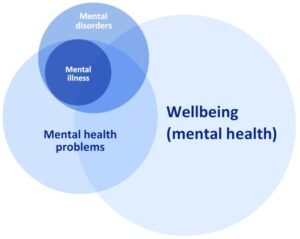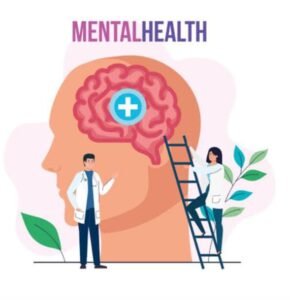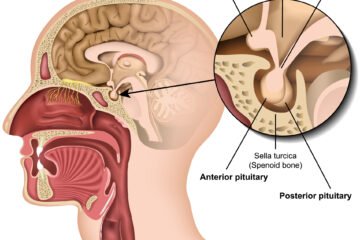
MENTAL HEALTH
Mental health is all about how you’re feeling emotionally, psychologically, and socially. It’s like a big umbrella that covers your thoughts, emotions, and behaviors. Basically, it’s about how you handle stress, interact with others, and make decisions. Just like you take care of your body by eating well and exercising, taking care of your mental health is equally important. It’s about finding that sweet spot where you feel good emotionally, mentally, socially, and psychologically. And hey, if you ever feel like things are tough, it’s totally okay to reach out for help. Talking to someone you trust is a great way to start feeling better. Remember, it’s a sign of strength to ask for support when you need it.
So, is mental health similar to mental illness?
No, it’s not, they both are related concepts but have different meanings.
MENTAL ILLNESS:

Mental illness refers to specific conditions that impact how a person thinks, feels, behaves, or their mood. It can affect their daily functioning and may require professional help or treatment. Mental illnesses can range from common disorders like anxiety and depression to more severe conditions such as schizophrenia. It’s important to recognize that mental illness is a medical condition, not a personal weakness. Seeking support from mental health professionals is essential for effectively managing and treating mental illnesses. If you or someone you know is showing signs of a mental illness, it’s important to reach out for help and guidance.
MENTAL HEALTH PROBLEMS:

Mental health problems encompass a variety of conditions that impact a person’s thoughts, emotions, and behaviors. These issues can influence one’s emotional well-being, relationships, and daily activities. Mental health problems range from temporary stress or anxiety to more serious disorders like depression or bipolar disorder. Recognizing the signs of mental health problems and seeking assistance when necessary are crucial steps in managing and improving mental well-being. Talking to a trusted individual or a mental health professional can be instrumental in addressing and overcoming mental health challenges. Remember, seeking support is a positive step towards addressing mental health concerns.
LIST OF SOME MENTAL HEALTH PROBLEMS:
- Anxiety disorders: Such as generalized anxiety disorder, social anxiety disorder, panic disorder, and phobias.
- Mood disorders: Like depression, bipolar disorder, and seasonal affective disorder.
- Eating disorders: Such as anorexia nervosa, bulimia nervosa, and binge-eating disorder.
- Personality disorders: Like borderline personality disorder, narcissistic personality disorder, and obsessive-compulsive personality disorder.
- Post-traumatic stress disorder (PTSD): A mental health condition triggered by a terrifying event.
- Attention-deficit/hyperactivity disorder (ADHD): A chronic condition that includes difficulty focusing, hyperactivity, and impulsive behavior.
MENTAL DISORDERS:
Mental disorders are conditions that affect how a person thinks, feels, or behaves. They can impact various aspects of life and may require professional help for management and treatment. Mental disorders can range from common issues like anxiety and depression to more severe conditions such as schizophrenia. Seeking support from mental health professionals is essential for effectively addressing mental disorders. If you or someone you know is experiencing symptoms of a mental disorder, it’s important to seek assistance and guidance.
CAN THEY BE CURED:
Some mental disorders can be effectively managed and treated with therapy, medication, and other interventions, it’s important to recognize that not all mental disorders can be completely cured. However, with appropriate treatment and support, many individuals can experience significant improvements in their symptoms and overall well-being. Consulting with mental health professionals to develop a personalized treatment plan tailored to address the specific needs and challenges associated with a particular mental disorder is crucial. Remember, seeking help and adhering to a treatment plan can lead to positive outcomes in managing mental normality conditions.
HOW TO TAKE CARE OF MENTAL HEALTH:

Taking care of your sound mind involves various strategies and practices that can help promote well-being and emotional balance. Here are some tips to consider:
- Maintain a Healthy Lifestyle: Ensure you are getting enough sleep, eating a balanced diet, and engaging in regular physical activity. Physical health is closely linked to mental well-being.
- Stay Connected: Foster supportive relationships with friends, family, or a therapist. Social connections can provide a sense of belonging and support during challenging times.
- Practice Stress Management: Learn techniques to manage stress, such as deep breathing, meditation, yoga, or mindfulness. These practices can help reduce anxiety and promote relaxation.
- Set Boundaries: Establish healthy boundaries in your relationships and commitments to prevent burnout and prioritize self-care.
- Engage in Activities You Enjoy: Pursue hobbies, interests, or activities that bring you joy and relaxation. Taking time for activities you love can boost your mood and overall well-being.
- Seek Professional Help: If you are struggling with your mental stability, don’t hesitate to seek help from a mental health professional. Therapy or counseling can provide valuable support and guidance.
- Limit Screen Time: Reduce exposure to negative news and social media, as excessive screen time can impact mental balance. Balance your digital interactions with real-world activities.
Remember, taking care of your mental stability is a continuous process that requires self-awareness, self-compassion, and seeking help when needed. Prioritizing your mental well-being is essential for overall health and happiness.
By using this site, you agree to the Terms and conditions and Privacy Policy of https://beautyvitalityco.com/
Previous post: https://beautyvitalityco.com/nutrition-types-uses-and-consumption/



2 Comments
Heart: Composition, Functions, Problems And Solutions And Amazing Facts | · July 13, 2024 at 4:47 pm
[…] Previous post: https://beautyvitalityco.com/mental-health-illness-problems-disorders-treatment-and-shocking-facts/ […]
What Is Sleep Hygiene? | · July 20, 2024 at 7:48 pm
[…] calm your mind for better sleep hygiene, it’s helpful to establish a relaxing bedtime routine. You can start […]